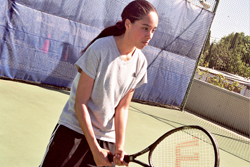Under Pressure
The heat was on during 15-year-old Kathryn’s first tennis match.
I figured I had to start on my glory path somewhere, so I joined the United States Tennis Association and registered to play in a tournament.
Once I got to the Beverly Hills Tennis Center, I stretched in the locker room, then spent about 30 minutes trying to calm down. I was relieved when they finally called my name. A perfectionist at heart, I was freaking out about the match. My palms were so sweaty that I couldn’t even grip my tennis racket, and it took several wipes on my pants to get them dry.
So there I was, not even 10 minutes into the first set, and I was already losing … horribly. With her powerful game of ground strokes and topspins, my opponent made me look like a dog playing fetch as I constantly struggled to return her shots. Her serves were nothing like what I had ever gone up against in practice. I felt like I was drowning.
A typical point involved her hitting a powerful spin serve and me hitting a weak return. If I was lucky the ball landed in and the point continued. But then my shots would usually go out of bounds in the next rally. I knew she wasn’t better than me—why was my game so off?
I was also really thrown by the crowd—a watching and judging group of parents, a presence I had never experienced before. I got so nervous over what I imagined them to be thinking about me that I completely lost focus on the match. Even worse, while I continued to analyze my mistakes from past points the game went on, and I fell even further and further behind.
I had envisioned spectacular matches, in which I easily defeated my opponents wielding a stellar serve and a killer backhand. However, after only 33 minutes, I got the shock of my life when I lost in the first round, 6-1, 6-0.
Perhaps the worst part was how chummy the other girl seemed, while my insides were a fuming wreck. She would bounce over to me in between games with a pop-princess attitude and just bubble out questions, even though I was clearly not in the mood to talk.
"So how long have you been playing tennis?"
"Umm … about four years."
"Right, eight here," she continued. "Do you practice with your school or is this just like a hobby sort of thing?"
"Hobby."
"Wow, that’s so cool. I’ve been playing for three years at school and my coach …"
It drove me nuts that she didn’t seem to understand that my body language was clearly telling her to stop talking to me.
At the end of the match I silently shook her hand at the net and then walked off the court to the parking lot. While walking I passed others still playing their matches. Mine was probably the first defeat of the day. I felt terrible knowing that.
On the way home my mother was supportive, which annoyed me to no end. Her constant barrage of encouraging words and inspirational phrases were totally unwanted. I had no interest in hearing, "Oh, you’ll do better next year," or "All you need is more practice," even though I knew she meant well. How was she able to put on a happy face? Didn’t she know how ashamed I was to have her see my pathetic match? Returning home seemed like a blessing. I could finally distance myself from her peppiness and do my homework.
I looked inside myself for answers
What had gone wrong? I wondered afterward. I didn’t believe that I was the worse tennis player. Instead, I realized that my entire strategy was flawed from the start.
First off, my arms and wrists were too tense throughout the match, which is disastrous for a tennis player. My shots kept falling short. The girl I was playing had more fluid swings and her shots flew across the court.
I was also worried about how my loss would reflect on my coach, my tennis-playing friends at school, or on my brag sheet, and that nervousness spelled my defeat. The fear of being imperfect was so overwhelming that I wasn’t able to play as well as I had even a year before.
Returning to practices, it really irritated me when I found that I could play perfectly well. I hated that my perfectionism had such an adverse effect on my sportsmanship and my game.
Reading an article about spelling bees a few weeks later helped me get over my loss. One of the featured contestants was really descriptive about his loss after failing to remember the spelling of a word. After months of memorization, he had lost it all because of amped-up nerves. I immediately drew parallels between that person’s situation and mine. We had both lost because of pressure.
While I was playing, I had concentrated more on the past points instead of trying to plan for the next point. Instead of treating the match as an extra-curricular, I thought that it would determine the rest of my athletic career. In wanting to create the perfect sounding "pop" off the racket, I had treated the match more like my doomsday than a fun day, which was perhaps my greatest flaw.
Later I entered another competition, and I won by default. It seems the other girl couldn’t hack the threat of losing, either!





